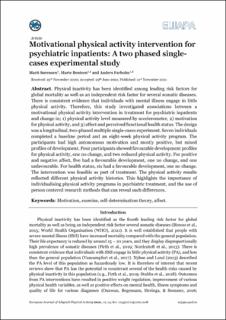| dc.contributor.author | Sørensen, Marit | |
| dc.contributor.author | Bentzen, Marte | |
| dc.contributor.author | Farholm, Anders | |
| dc.date.accessioned | 2022-03-21T20:52:08Z | |
| dc.date.available | 2022-03-21T20:52:08Z | |
| dc.date.created | 2021-11-26T07:16:09Z | |
| dc.date.issued | 2021 | |
| dc.identifier.citation | European Journal of Adapted Physical Activity. 2021, 14 (2), Artikkel 14. | en_US |
| dc.identifier.issn | 1803-3857 | |
| dc.identifier.uri | https://hdl.handle.net/11250/2986637 | |
| dc.description | This is an open access article distributed under the terms of the Creative Commons Attribution 4.0 International License (CC BY 4.0), which permits use, distribution, and reproduction in any medium, provided the original publication is properly cited. No use, distribution or reproduction is permitted which does not comply with these terms. | en_US |
| dc.description.abstract | Physical inactivity has been identified among leading risk factors for global mortality as well as an independent risk factor for several somatic diseases. There is consistent evidence that individuals with mental illness engage in little physical activity. Therefore, this study investigated associations between a motivational physical activity intervention in treatment for psychiatric inpatients and change in; 1) physical activity level measured by accelerometer, 2) motivation for physical activity, and 3) affect and perceived functional health status. The design was a longitudinal, two-phased multiple single-cases experiment. Seven individuals completed a baseline period and an eight-week physical activity program. The participants had high autonomous motivation and mostly positive, but mixed profiles of development. Four participants showed favourable development profiles for physical activity, one no change, and two reduced physical activity. For positive and negative affect, five had a favourable development, one no change, and one unfavourable. For health status, six had a favourable development, one no change. The intervention was feasible as part of treatment. The physical activity results reflected different physical activity histories. This highlights the importance of individualising physical activity programs in psychiatric treatment, and the use of person centered research methods that can reveal such differences. | en_US |
| dc.language.iso | eng | en_US |
| dc.subject | affect | en_US |
| dc.subject | exercise | en_US |
| dc.subject | motivation | en_US |
| dc.subject | self-determination theory | en_US |
| dc.title | Motivational physical activity intervention for psychiatric inpatients: A two phased single-cases experimental study | en_US |
| dc.type | Peer reviewed | en_US |
| dc.type | Journal article | en_US |
| dc.description.version | publishedVersion | en_US |
| dc.rights.holder | © 2021 by the authors | en_US |
| dc.source.pagenumber | 17 | en_US |
| dc.source.volume | 14 | en_US |
| dc.source.journal | European Journal of Adapted Physical Activity | en_US |
| dc.source.issue | 2 | en_US |
| dc.identifier.doi | 10.5507/euj.2021.008 | |
| dc.identifier.cristin | 1959457 | |
| dc.description.localcode | Institutt for idrett og samfunnsvitenskap / Department of Sport and Social Sciences | en_US |
| dc.source.articlenumber | 14 | en_US |
| cristin.ispublished | true | |
| cristin.fulltext | original | |
| cristin.qualitycode | 1 | |
